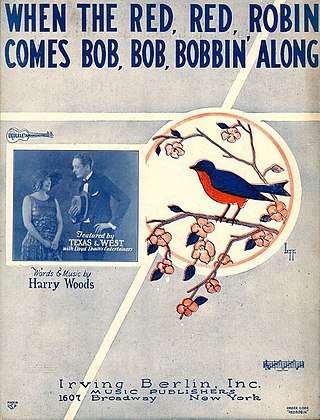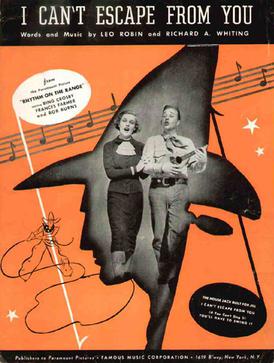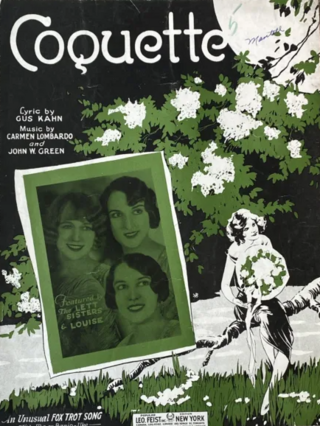
"Back in Your Own Back Yard" is a popular song. Officially the credits show it as written by Al Jolson, Billy Rose, and Dave Dreyer; in fact, Billy Rose was exclusively a lyricist, Dreyer a composer, and Al Jolson a performer who was often given credits so he could earn some more money, so the actual apportionment of the credits would be likely to be music by Dreyer, lyrics by Rose, and possibly some small contribution by Jolson.
"A Hundred Years from Today" is a popular song published in 1933 with music by Victor Young and lyrics by Ned Washington and Joe Young. The song was included in the London production of Lew Leslie's Blackbirds of 1934.

"Painting the Clouds with Sunshine" is a popular song published in 1929. The music was written by Joe Burke and the lyrics by Al Dubin for the 1929 musical film Gold Diggers of Broadway when it was sung by Nick Lucas. Gold Diggers of Broadway is a partially lost film, and the scene featuring the song is one of the only surviving scenes of the movie.
"Oh, Lady Be Good!" is a 1924 song by George and Ira Gershwin. It was introduced by Walter Catlett in the Broadway musical Lady, Be Good! written by Guy Bolton, Fred Thompson, and the Gershwin brothers and starring Fred and Adele Astaire. The song was also performed by the chorus in the film Lady Be Good (1941), although the film is unrelated to the musical.
"The One I Love (Belongs to Somebody Else)" is a popular song composed by Isham Jones with lyrics by Gus Kahn. The song was recorded by Isham Jones' Orchestra on December 21, 1923, at Brunswick Studios in New York City, and published on January 7, 1924. On January 17 in Chicago, Jones recorded another version, with Al Jolson on lead vocals. Both versions made the charts that Spring, with Jolson's peaking at number 2, and Jones' at number 5. Sophie Tucker recorded her version February 1924, released on Okeh 40054.

"Somebody Loves Me" is a popular song, with music written by George Gershwin, and lyrics by Ballard MacDonald and Buddy DeSylva. The song was published in 1924 and featured in George White's Scandals of 1924.
"Put 'em in a Box, Tie 'em with a Ribbon, and Throw 'em in the Deep Blue Sea" is a popular song. The music was written by Jule Styne, the lyrics by Sammy Cahn. The song was published in 1947, and was further popularized in the 1948 movie Romance on the High Seas, where it was sung by Doris Day accompanied by the Page Cavanaugh Trio. The lyrics deal with a person who is through with love and therefore metaphorically wants to throw everything away in a box into the sea.
"I Was Doing All Right" is a song composed by George Gershwin, with lyrics by Ira Gershwin. It was introduced by Ella Logan in the 1937 film The Goldwyn Follies.
"That Certain Feeling" is a 1925 song composed by George Gershwin, with lyrics by Ira Gershwin.
"As Long as I Live" is a song composed by Harold Arlen, with lyrics by Ted Koehler, it was written for their last show at the Cotton Club Parade, in 1934. It was introduced by Avon Long and Lena Horne.
"Get Out of Town" is a 1938 popular song written by Cole Porter, for his musical Leave It to Me!, where it was introduced by Tamara Drasin.
"Please Be Kind" is a 1938 American song composed by Saul Chaplin with lyrics by Sammy Cahn. Popular recordings that year were by Mildred Bailey and the Red Norvo Orchestra; Bob Crosby & His Orchestra ; and by Benny Goodman & His Orchestra.

"Out of Nowhere" is a popular song composed by Johnny Green with lyrics by Edward Heyman and published by Famous Music. It was popularized by Bing Crosby, and was the first recording under his Brunswick Records contract. He recorded it on March 30, 1931 and it became his first number one hit as a solo artist. Crosby also sang it in the film Confessions of a Co-Ed (1931) and in his short film I Surrender Dear (1931). He recorded it again in 1954 for his album Bing: A Musical Autobiography.

"Runnin' Wild" is a popular song first composed and recorded in 1922, written by Arthur Harrington Gibbs with lyrics by Joe Grey and Leo Wood.
"Tomorrow Night" is a 1939 song written by Sam Coslow and Will Grosz. A version by Horace Heidt and His Musical Knights was very popular in 1939.

"There's a Rainbow 'Round My Shoulder" is a 1928 song sung by Al Jolson in the early Warner Bros. talking picture The Singing Fool the same year. The song, along with "Sonny Boy" and "I'm Sitting on Top of the World", which were also in The Singing Fool, were big hits for Jolson. The song was written by Al Jolson, Billy Rose and Dave Dreyer.

"When the Red, Red Robin " is a popular song written, both words and music, by Harry Woods in 1926. The song became the signature song for singer and actress Lillian Roth, who performed it often during the height of her musical career from the late 1920s to the late 1930s.
Moanin' Low is a popular torch song. The music was written by Ralph Rainger; the lyrics by Howard Dietz. The song was published in 1929 and was introduced that same year in the musical revue The Little Show by Libby Holman becoming a hit and Holman's signature song. A recording by The Charleston Chasers was also popular in 1929.

"I Can't Escape from You" is a song written music by Richard A. Whiting and lyrics by Leo Robin for the 1936 Paramount Film "Rhythm on the Range", and first introduced in the film when Bing Crosby sang it to Frances Farmer. Crosby recorded it for Decca Records that same year with the Jimmy Dorsey Orchestra and it was in the hit parade for 11 weeks reaching a peak position of No. 7. Crosby recorded the song again in 1954 for his album Bing: A Musical Autobiography.

"Coquette" is a 1928 fox trot jazz standard. It was composed by Johnny Green and Carmen Lombardo, with lyrics by Gus Kahn. Guy Lombardo had great success with the song in 1928.








